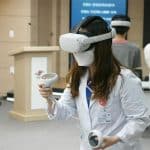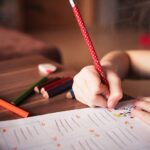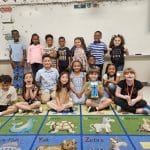June 17, 2021
Social Emotional Learning (SEL)
High school students have experienced rising stress levels and lower engagement with learning since the start of the COVID-19 pandemic, according to a new study by NBC News and Challenge Success, a nonprofit affiliated with the Stanford Graduate School of Education (GSE).
Children feel that they are more stressed than they were before the pandemic, they have more work, they are less engaged in school, and their relationships with teachers and other kids are strained when using virtual learning platforms. Confined within the walls of home and constant fear of COVID have increased the anxiety, stress and anger levels in individuals. The situation seems to be everlasting with the changed variants of COVID hitting countries around the world.
On one hand, technology intervention has revolutionized the teaching-learning pedagogies during COVID times, on the other hand, many students in absence of devices are deprived of their basic right of education.
This situation is alarming and a cause for concern. A need for the adoption of SEL in learning is to be thought of to address emotional wellbeing in students attending virtual schools and also to the students who couldn’t join virtual learning platforms because of various reasons.
Social-emotional learning (SEL), is a behavioral framework that encompasses several skills which affect academic performance and life success. Studies have shown that the infusion of SEL in learning has improved academic performance, resulting in fewer disciplinary issues and greater awareness in students in understanding and handling their emotions effectively.
The Collaborative for Academic, Social and Emotional Learning (CASEL) identifies and offers five competencies of SEL: self-awareness, self-management, social awareness, relationship skills, and responsible decision making. All these skills if practiced explicitly and implicitly positively impact students’ emotional wellbeing by enhancing their skills when dealing with problems in social and emotional domains. The below-mentioned illustration shows the interconnectedness of SEL with schools and communities.

SEL skills are the life skills required to be successful in this rapidly changing world.
SEL addresses 5 competencies that help individuals manage their social and emotional wellbeing effectively.
- Self-Awareness
- Self-management
- Social Awareness
- Relationship Skills
- Responsible decision making
These competencies are designed to provide a mapwork to navigate through in the learning process and help students and adults benefit from the same by understanding them and applying them effectively in their day-to-day lives.
Nurturing these core competencies within individual students through social and emotional learning is a healthy and rewarding process that can subsequently have a positive effect on the wellbeing of individuals. The interconnectedness of these competencies reflects how each competency influences others and therefore work towards the overall development of an individual in his/ her social-emotional learning domain.
Self -Awareness
“Look outside and you will see yourself. Look inside and you will find yourself.” — Drew Gerald
Self-awareness is the ability to understand our own emotions, thoughts, values, and experiences, and how they can impact our actions. Improving our self-awareness can allow us to identify our strengths and weaknesses more effectively. This also compliments other competencies such as self-management, social awareness, relationship skills and responsible decision making. Most of the students face challenges in expressing their emotions which leads to a misinterpretation of emotions.
If individuals are aware of their emotions and can label them accurately, it helps them to recognise and manage the same effectively by understanding various strategies that they can use according to their identified strengths and weaknesses. Recognising and labelling inner emotions, thoughts and values helps in understanding them correctly and adopting an appropriate course of action to address the same.
Self-Management
Making appointments with yourself and scheduling other things around them is key to proactive self-management. – Michael Hyatt
This competency focuses on an individual’s ability to regulate and control one’s emotions, thoughts and behaviours. Regulating one’s thoughts, emotions and behaviours enhances the abilities of stress management, organisation skills, impulse control and self-discipline which are important core skills or life skills. It helps and empowers an individual to understand where he/ she is in terms of self-regulation to be able to decide a pathway to evolve further.
Social Awareness
Self-awareness is the ability to take an honest look at your life without any attachment to it being right or wrong, good or bad. – Debbie Ford
Social awareness involves the ability to understand and empathize with others by showing concern for the feelings of others, understanding and expressing gratitude, recognizing strengths in others and identifying diverse social norms, including unjust ones.
Students with strong social awareness can adapt more easily to their environment, engage in constructive communication with their peers and resolve conflicts when they arise and are less prone to emotional distress and less likely to engage in risky behaviour. This, in turn, creates Positive Classroom Climate and better relationships, where students can focus on learning.
Relationship Skills
“Relationships are at the heart of schooling.”—Mark Twain
“Relationship skills” is the ability to build positive relationships by demonstrating cultural humility, practicing teamwork and collaborative problem-solving, resolving conflicts constructively, approaching relationships with positive presuppositions, resisting negative social pressure and stereotypes and standing up for the rights of others.
There is a myriad of benefits to building positive relationships skills. They make us feel connected, help us build and maintain meaningful connections across race, culture, age, and distance; support one another during collective grief and struggle; and collaboratively find solutions to new obstacles.
Responsible Decision Making
“Between stimulus and response, there is space. In that space is our power to choose our response. In our response lies our growth and our freedom.” —Viktor E. Frankl
Responsible decision-making means making responsible choices that promote personal, family, and community well-being. It is not only about avoiding negative consequences but about making decisions that are socially and ethically appropriate and take into account the impact on others.
It is about knowing how to extrapolate the effects of those decisions on family and friends, their community, and their world. This process will help students learn relationship skills, empathy, and how to communicate effectively.
Our team Wellbeing Mantra comprising of two educators (Ms Gunjan Tomar and Ms Vineeta Garg) have been working towards creating e-content for SEL skills. This e-content is free of cost to help educators around the world to use them for addressing SEL in classrooms. It has stories related to SEL competencies with follow up activities that can be used by educators for their students. The activities are either towards the end of the videos or can be accessed from the description box of the Wellbeing Mantra’s YouTube Channel depending on the format in which the videos are made.
The list and description of this e-content is as follows:
1) An overview of life skills
This video explains that Life Skills are the building blocks or framework that allow students to apply the knowledge they acquire in school to real-world problems and situations. Also referred to as “soft skills” they help children to acquire the ability to think in an abstract way and approach problems from multiple angles to find practical solutions and communicate clearly and effectively. Watch this video to know more about ‘Life Skills’, the skills which we need to make the most out of our lives.
2) A story on self-awareness
This video is about Self- Awareness. Self-awareness helps us to have a better understanding of ourselves and recognize ourselves as unique individuals. It empowers us to build up our strengths and work on the areas that need improvement. This is a small effort to help our students identify the same. Some engaging follow up activities can help the learners get a better understanding of the story.
3) A story about Empathy
This video content is about Empathy. Empathy is the ability to imagine what life is for another person, even in a situation that we may not be familiar with. It is like having an invisible link with someone, which allows us to understand what they feel and experience. Watch this video to learn why practicing empathy is important to not only improve our lives but also the lives of those around us even if just a little. Activities like acrostic of Empathy, Empathy X Ray and Empathy Bingo games are some of the interesting activities in this e- content pack that can be used with students.
4) A story about Organization (Time Management)
Time management is the process of planning and exercising conscious control of time spent on specific activities, especially to increase effectiveness, efficiency, and productivity. It is a much-required skill in today’s world when the boundaries of time of work and leisure are blurring. Well managed time helps us to plan our work better and minimizes the stress of completing all the piled-up work. Have a look at our Grasshopper and Ants story with a new look and perspective. Schools generally have ongoing assessments and assignments for students. This resource is useful for teachers to help students manage their time effectively and plan efficiently. Link to activity worksheet: Time Management Activity
5) A story about Positive Communication
“Words have the power of both destroy and heal. When words are both true and kind, they can change our world” – Gautam Buddha. Let’s get committed to positive communication to resolve differences and make life less stressful, to solve problems and build trust and respect, to get you, friends, for life and make every moment more pleasant, and finally to create an environment where affection and caring can flourish. This resource of positive communication will help the learners reflect on their communication skills and make a conscious effort to make their communication positive.
Follow up Activity in MS Forms- Positive Communication Activity
6) An activity about Responsible Decision Making
This video is an effort to address social justice by creating a community of responsible decision-makers who are equipped to make ethical, constructive choices about personal and social behaviour. Do you encourage your students to explore cultural, social, and environmental issues with a humanistic lens? Do you think that empathy is one of the most important building blocks for any kind of social justice action? Watch this video to understand how addressing social justice in the classroom by integrating responsible decision making, an important component of SEL.
7) Practicing Attitude of Gratitude
Gratitude has a moderately-to-strong correlation with well-being. The world has been battling with the COVID 19 crisis for more than a year. These times have taught human kind the importance of relationships and recognise the efforts of the people who are involved in helping save lives. Health workers, essential service providers are such warriors who have worked tirelessly for us and it’s time to express gratitude towards corona warriors.
This video is a small effort from our side to applause the unsung heroes on the frontline of the battle against coronavirus along with the ones who are supporting this in their own small and big ways. We hope this video will help the students recognise all the big and small efforts of people around them and show their gratitude towards their efforts. A gratitude journal can be introduced to students to keep a note or make a list of the people they are thankful to in their lives to learn from and reciprocate the same to the community.
8) A podcast about how mindful breathing helps develop mindfulness
Mindful breathing can be considered as the practice of tuning in completely to the experience of the breath in our body. Mindfulness is not just about being present, but truly recognizing our experience and seeing it clearly. Keep breathing mindfully and take charge of your life. This life is ours and life is beautiful. Make the most of it and be happy. This podcast is especially for educators who require these moments the most to be able to pass on the same to their students.
We continue to provide our services to the best of our abilities in the area of social emotional learning to help educators with the resource pool of SEL.
You can listen to the podcast by clicking here: Establishing Connection Between Self Belief And Mindful Breathing

References
Student stress during the pandemic | Stanford Graduate School of Education
https://www.positiveaction.net/blog/sel-competencies
CBSE Life Skills Teachers’ Manual
CASEL












0 Comments